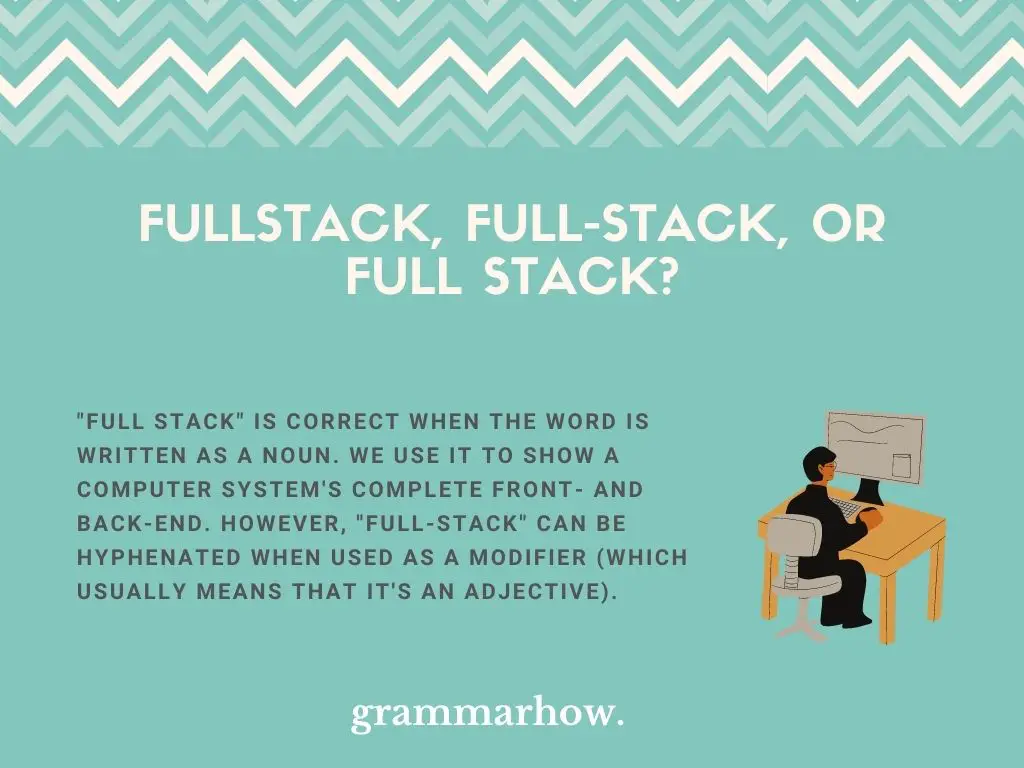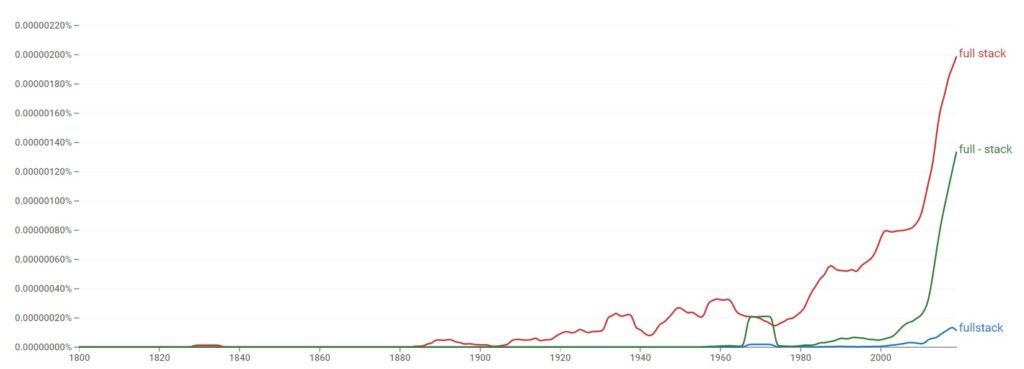The term “full-stack” isn’t something you’ll come by often. However, it would make sense to look more into the phrase if you are dealing with the back-end of computer software. If you know whether it’s hyphenated or split into one or two words, you’ll have a better time writing it.
Full stack vs. Full-stack vs. Fullstack
“Full stack” is correct when the word is written as a noun. We use it to show a computer system’s complete front- and back-end. However, “full-stack” can be hyphenated when used as a modifier (which usually means that it’s an adjective).

According to Google Ngram Viewer, “fulls stack” is the most popular choice. However, there really isn’t that much between it and the hyphenated form, which shows that there are a lot of similarities between using it as a noun or an adjective.

In The Oxford Dictionary, “full stack” is officially recognized as the correct spelling variation. The Oxford Dictionary states that it is a noun and should be used in such a way.
However, the example provided in the Oxford Dictionary shows that “full-stack” works as a modifier, and it’s written with the hyphen in the example provided. This shows that both forms are grammatically correct, and it depends entirely on usage.
If you’re unsure about the differences between nouns and adjectives, you might benefit from the following:
- Noun: I would like to know more about the full stack here.
- Adjective: The full-stack system is very important to the operation.
Is “Fullstack” One Word?
“Fullstack” is the only form that is not officially recognized by any dictionaries. Therefore, it is not correct to use, and you should avoid doing so. It was also the least used variation, according to the graph, which shows that it rarely gets written in this incorrect form.
Check these examples out if you want more information about what actually works:
- Correct: If you’re interested in getting full-stack experience, you should talk to your manager.
- Incorrect: The fullstack instructions were not clear, and I’ve made a serious error.
- Correct: If you haven’t learned more about the full stack, I don’t want to hear from you.
- Incorrect: What can you tell me about this system’s fullstack?
Is “Full stack” Two Words?
We can write “full stack” as two words when it’s a noun. In this case, it does not modify any other words in the sentence. Instead, we can see it as “full” modifying “stack” to show that we want the entire system to be explained.
Here are some examples that might clear things up:
- Have you got access to the full stack? I need to know what’s going on behind the scenes.
- The full stack wasn’t made easy for people to access. We need to fix that.
- Is there any way for me to see what’s happening in the full stack?
- I learned a lot from my time at the IT firm. The full stack is one of the most important things you need.
Is “Full-stack” Hyphenated?
“Full-stack” should be hyphenated whenever it’s used as a modifier. In this case, it becomes an adjective that modifies another noun. Typically, that noun will come directly after “full-stack,” which helps us to understand what is being said.
The AP Stylebook guidelines are what we use when learning about hyphen rules. It teaches us that multiple words should always be linked with a hyphen when they all work to modify the same noun. There are no exceptions to this rule.
Here are some examples of how it works:
- Have you got any full-stack developer experience that you think will be helpful here?
- I think you should take a look into the full-stack system before doing anything else.
- The full-stack bugs are coming through thick and fast!
- I can’t figure out what full-stack programming requires.
Is “Stack” Capitalized In The Word “Full-Stack”?
The only time you might need to capitalize “full-stack” is when it’s in a title. Since it’s not a proper noun, neither part of the hyphenated form needs a capital letter.
However, if you capitalize every other word in your title, you might think it wise to capitalize both parts of the hyphenated form to keep it in line with the rest.

Martin holds a Master’s degree in Finance and International Business. He has six years of experience in professional communication with clients, executives, and colleagues. Furthermore, he has teaching experience from Aarhus University. Martin has been featured as an expert in communication and teaching on Forbes and Shopify. Read more about Martin here.
